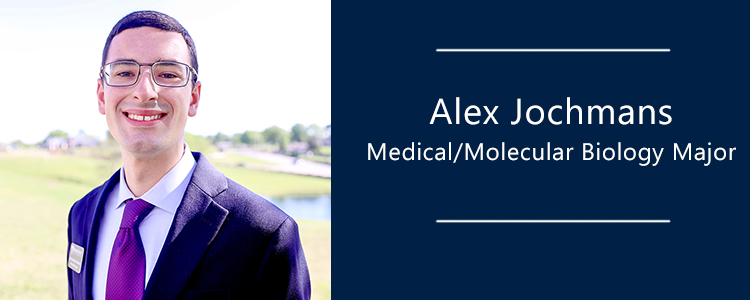
Rogers State University student Alexander Jochmans was selected for the University of Oklahoma Health Sciences Center’s Summer Undergraduate Research Experience program, which prepares and encourages undergraduate students to pursue careers in biomedical research or health related sciences.
SURE students receive a summer stipend of $5,000 to cover living expenses. Only ten students from intuitions throughout Oklahoma were selected this year.
“Alex is bright and quick to learn new techniques and difficult concepts of various experiments. His quality as a research student is exceptional,” Dr. Jin Seo, associate professor of biology, said. “I’m very proud that he has been selected for the summer research program at the OUHSC. This research experience will greatly advance his career goal as a scientist.”
SURE introduces outstanding undergraduate students to the rigorous academic preparation in intensive, hands-on research experiences in the laboratories of OUHSC biomedical faculty mentors. Scholars are selected based on aptitude and interest in science and math, academic standing, essays and recommendation letters written as part of the application process.
Jochmans, a medical/molecular biology sophomore from Claremore, will spend eight weeks in Oklahoma City studying the parasite Toxoplasma gondii. Jochmans will be paired with Dr. Kevin Brown, a researcher and assistant professor from OU’s department of microbiology and immunology.
“I am captivated by biology as a career because of how much knowledge remains to be uncovered, and how useful that knowledge can be. Biological research can be slow and unfruitful at times, but there is a certain joy in the process itself, as well as the possibility of new findings being just around the corner, which drive my research endeavors,” Jochmans said.
Toxoplasma gondii, which is naturally spread in cat feces, is known to infect approximately 1/3 of the human population, infiltrating and reproducing inside its host quickly before becoming encysted in bodily tissues. In order to reproduce inside of host cells, the parasite relies on specific molecular signaling pathways to shut off its movement once it has infiltrated a cell.
Jochmans’ research will focus on analyzing two enzymes involved in molecular signaling pathways and decipher what proteins they interact with to better understand the ways in which T. gondii regulates its motility.
“By elucidating the proteins involved in these pathways, we could better understand the biology of this parasite and related species and find targets for drug and vaccine development. I am very excited to take part in this research, since parasitology is one of my favorite subjects,” Jochmans said.
Jochmans has worked alongside Dr. Seo to sharpen his critical research mindset while learning several common and useful techniques, such as raising and breeding fruit flies, performing cell culture and transfections, and working with ribonucleic acids.
“Dr. Seo has been an amazing mentor, taking the time to teach me concepts and skills while providing me with advice on research opportunities and graduate school,” Jochmans said. “I likely would have been much less prepared for the SURE program and graduate school without his help. Dr. Seo has played a pivotal role in refining my intellectual curiosity and endeavors, helping me to fully realize and aspire to attainable goals in biological research.”
Jochmans believes RSU’s small class sizes and caring faculty have helped him thrive academically and personally.
“RSU has provided me with an environment which has been very conducive to my advancement. The campus and classes are small enough that I have gotten to know many of my professors and peers,” Jochmans said. “The faculty consistently display a genuine interest in my development and success. I believe these defining characteristics of RSU definitely have helped me to grow as a researcher, a scholar and an individual.”
RSU offers a bachelor’s degree in biology with an option in environmental conservation along with associate degrees in biological science or physical science with options in geology and chemistry. RSU students have access to a 100-acre, nature reserve at the Claremore campus that serves both research and recreation purposes and the RSU Scientific Research Station, a 260-acre undeveloped site about five miles southwest of Claremore.
For more information on these programs, visit www.rsu.edu/biology.
